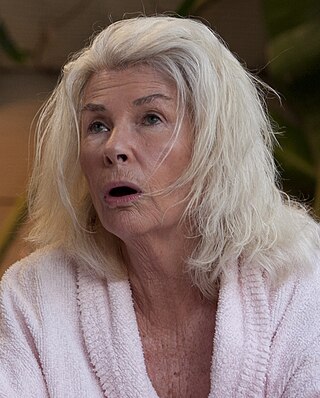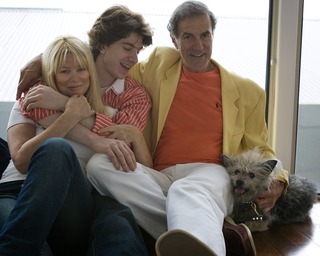
The Removalists is a play written by Australian playwright David Williamson in 1971. The main issues the play addresses are violence, specifically domestic violence, and the abuse of power and authority. The story is supposed to be a microcosm of 1970s Australian society.

Emerald City is a 1988 Australian comedy-drama film directed by Michael Jenkins, based on the 1987 play of the same name by David Williamson. Much of the play's dialogue is retained though discussion of off-stage characters is usually replaced with their appearance, and a more conventionally cinematic level and speed of dialogue is maintained. Also, the younger daughter Hannah is omitted.
James David Sharman is an Australian director and writer for film and stage with more than 70 productions to his credit. He is renowned in Australia for his work as a theatre director since the 1960s, and is best known internationally as the director of the 1973 theatrical hit The Rocky Horror Show, its film adaptation The Rocky Horror Picture Show (1975) and the film's follow-up, Shock Treatment (1981).

Theatre of Australia refers to the history of the live performing arts in Australia: performed, written or produced by Australians.

Robyn Anne Nevin is an Australian actress, director, and stage producer, recognised with the Sidney Myer Performing Arts Awards and the JC Williamson Award at the Helpmann Awards for her outstanding contributions to Australian theatre performance art. Former head of both the Queensland Theatre Company and the Sydney Theatre Company, she has directed more than 30 productions and acted in more than 80 plays, collaborating with internationally renowned artists, including Richard Wherrett, Simon Phillips, Geoffrey Rush, Julie Andrews, Aubrey Mellor, Jennifer Flowers, Cate Blanchett and Lee Lewis.

Paul Denny is an Australian stage, television, and film actor.

Paul Atherstone Grabowsky, born 27 September 1958, is an Australian pianist and composer, founder of the Australian Art Orchestra.
Maxwell John Phipps was an Australian actor, known for a number of roles in theatre, films and television during the 1960s until the end of the 1990s.
Noel Ferrier AM was an Australian television personality, comedian, stage and film actor, raconteur, and theatrical producer. He had an extensive theatre career which spanned over fifty years.
Andrew Bovell is an Australian writer for theatre, film and television.
Stork is a 1971 Australian comedy film directed by Tim Burstall. Stork is based on the play The Coming of Stork by David Williamson. Bruce Spence and Jacki Weaver make their feature film debuts in Stork, being honoured at the 1972 Australian Film Institute Awards, where they shared the acting prize. Stork won the prize for best narrative feature and Tim Burstall won for best direction. Stork was one of the first ocker comedies. Stork was the first commercial success of the Australian cinema revival called the Australian New Wave.
Jill Jolliffe was an Australian journalist and author who reported on East Timor since 1975. She was the author of Finding Santana and Balibo.
Travelling North is a 1987 Australian film directed by Carl Schultz and starring Leo McKern, Julia Blake, Graham Kennedy and Henri Szeps. Based on an original 1979 play of the same name by David Williamson, it is one of Williamson's favourite movies based on his works. The act of "travelling north" as used in the title, in the context of the southern hemisphere in which the film and its original play are set, denotes transitioning from the colder, business-dominated southern regions of the Australian continent to the notionally more relaxed and warmer subtropical or tropical northern regions such as northern New South Wales and ultimately, far north Queensland.
David Wadelton is an Australian artist who lives and works in Melbourne. He is best known for his cyber-pop paintings, almost photorealist in style.
Karin Schaupp is a German-born Australian classical guitarist. She has won APRA Music Awards and ARIA Music Awards.
Flatfoot is a 2003 comedic play by David Williamson about the Roman playwright Plautus. It is one of Williamson's few plays not to be set in contemporary Australia and was written as a vehicle for actor Drew Forsythe. It is a play-within-a-play, featuring Plautus' play The Swaggering Soldier.

Allan Zavod was an Australian pianist, composer, jazz musician and occasional conductor whose career was mainly in America.
The 23rd Australian Film Institute Awards were held at the Regent Theatre, in Sydney, New South Wales on 16 September 1981. Presented by the Australian Film Institute (AFI), the awards celebrated the best in Australian feature film, documentary and short film productions of 1981. The ceremony was televised in Australia on ABC for the third year running, with John Bluthal presiding over the event.
George Whaley was an Australian actor, director and writer, known for his work across theatre and film.

Songs from the British Isles is a collobrative extended play by Australian singer songwriter Katie Noonan and Australian classical guitarist Karin Schaupp, available only from Katie Noonan webshop. It was released to support the tour 'Songs from the British Isles'.









